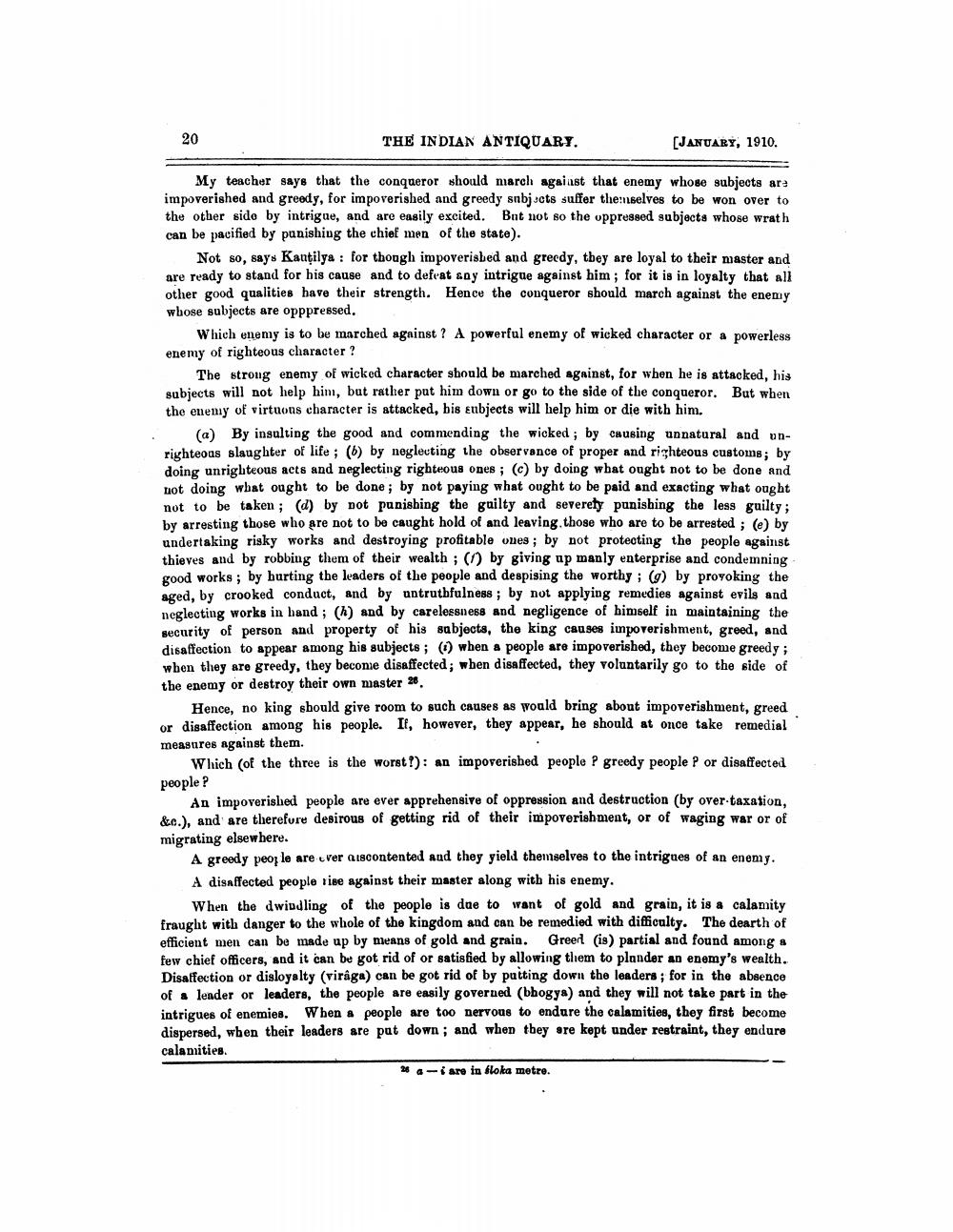________________
20
THE INDIAN ANTIQUARY.
(JANUARY, 1910.
My teacher says that the conqueror should march against that enemy whose subjects are impoverished and greedy, for impoverished and greedy snbjects suffer themselves to be won over to the other sido by intrigue, and are easily excited. But not so the oppressed subjects whose wrath can be pacified by punishing the chief men of the state).
Not so, says Kautilya : for though impoverished and greedy, they are loyal to their master and are ready to stand for his cause and to defeat say intrigue against him; for it is in loyalty that all other good qualities have their strength. Hence the conqueror should march against the enemy whose subjects are opppressed.
Which enemy is to be marched against ? A powerful enemy of wicked character or a powerless enemy of righteous character ?
The strong enemy of wicked character should be marched against, for when he is attacked, his subjects will not help him, but rather put him down or go to the side of the conqueror. But when the enemy of virtuons character is attacked, bis enbjects will help him or die with him.
(a) By insulting the good and commending the wicked; by causing unnatural and unrighteous slaughter of life; (b) by neglecting the observance of proper and righteous customs; by doing unrighteous acts and neglecting righteous ones; (c) by doing what ought not to be done and not doing what ought to be done ; by not paying what ought to be paid and exacting what ought not to be taken ; (d) by pot punishing the guilty and severety punishing the less guilty; by arresting those who are not to be caught hold of and leaving those who are to be arrested ; (e) by undertaking risky works and destroying profitable ones; by not protecting the people against thieves and by robbing them of their wealth ; () by giving up manly enterprise and condemning good works; by hurting the leaders of the people and despising the worthy ; (g) by provoking the aged, by crooked conduct, and by untruthfulness; by not applying remedies against evils and neglecting works in hand ; (h) and by carelessness and negligence of himself in maintaining the security of person and property of his subjects, the king causes impoverishment, greed, and disaffection to appear among his subjects ; ) when a people are impoverished, they become greedy ; when they are greedy, they become disaffected; when disaffected, they voluntarily go to the side of the enemy or destroy their own master 28
Hence, no king should give room to such causes as would bring about impoverishment, greed or disaffection among his people. If, however, they appear, he should at once take remedial measures against them.
Which of the three is the worst?): an imporerished people ? greedy people ? or disaffected people?
An impoverished people are ever apprehensive of oppression and destruction (by over taxation, &c.), and are therefore desirous of getting rid of their impoverishment, or of waging war or of migrating elsewhere.
A greedy people are ever miscontented and they yield themselves to the intrigues of an enemy. A disaffected people rise against their master along with his enemy.
When the dwindling of the people is due to want of gold and grain, it is a calamity fraught with danger to the whole of the kingdom and can be remedied with difficulty. The dearth of efficient men can be made up by means of gold and grain. Greert (is) partial and found among a few chief officers, and it can be got rid of or satisfied by allowing them to plander an enemy's wealth. Disaffection or disloyalty (virâga) can be got rid of by putting down the leaders; for in the absence of a leader or leaders, the people are easily governed (bhogya) and they will not take part in the intrigues of enemies. When a people are too nervous to endure the calamities, they first become dispersed, when their leaders are put down; and when they are kept under restraint, they endure calamities.
28 a-i are in sloka metre.




